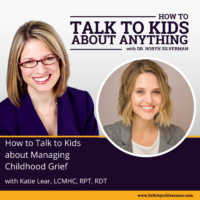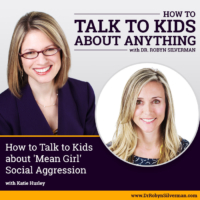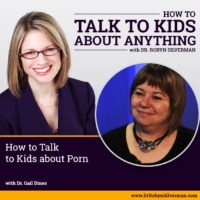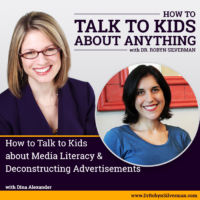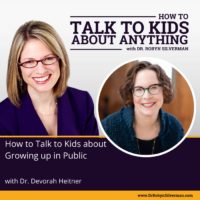Podcast: Play in new window | Download
Subscribe: Apple Podcasts | RSS | More
How to Talk to Kids about Childhood Illness
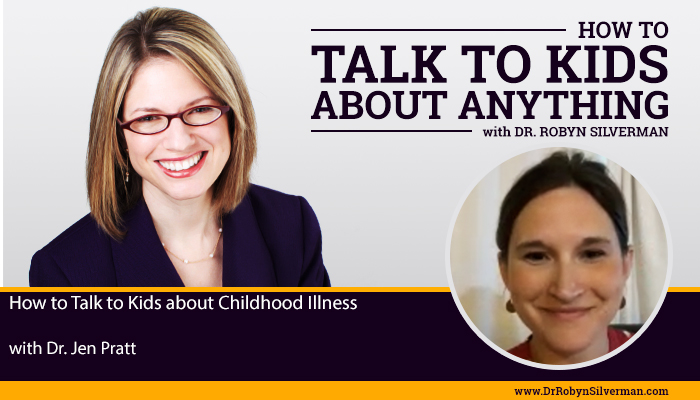
This podcast helps us understand how to talk to kids about childhood illnesses like cancer so that kids can get their questions answered and we can learn about their concerns, fears and misunderstandings. Dr. Robyn Silverman speaks to Dr. Jen Pratt, who had childhood cancer and is now a doctor who treats young patients.
Guest Expert: Dr. Jen Pratt
Childhood illness can turn a family’s life upside down. We probably all  have friends, neighbors, community members or maybe even family members who have coped with or are currently coping with childhood illness. While it wasn’t my child, many of you know that my dear friend’s son, Gavin, was diagnosed in 2018 with Ewing’s Sarcoma and I was there for the initial meetings, tests, surgeries and flew in for some of the hospital visits or just to help out with my friend’s other child who often has to be sidelined when a sibling is ill. It’s hard on everyone. Perhaps you remember the interview I did with Gavin’s sister who talked with us about being a sibling and unfortunately, because Gavin’s cancer was so aggressive and rare—he lost his battle with it, and Jadyn so beautifully discussed how to talk to kids and how to cope with the children who have lost a sibling. Those were hard talks, weren’t they? But we really do need to learn how to talk to kids about all of this. Perhaps you just want to know how to be a good friend or family member while someone else you know is going through this—I applaud you for being here because boy, do people need that. Perhaps you are here because you need to get some questions answered for yourself and your own child who is coping with a childhood illness from dealing with hospital stays, delays, medication, missing out, fear of the unknown and the intense feelings of most everyone around you who cares about you. For all of this, let’s turn to Dr. Jenn Pratt.
have friends, neighbors, community members or maybe even family members who have coped with or are currently coping with childhood illness. While it wasn’t my child, many of you know that my dear friend’s son, Gavin, was diagnosed in 2018 with Ewing’s Sarcoma and I was there for the initial meetings, tests, surgeries and flew in for some of the hospital visits or just to help out with my friend’s other child who often has to be sidelined when a sibling is ill. It’s hard on everyone. Perhaps you remember the interview I did with Gavin’s sister who talked with us about being a sibling and unfortunately, because Gavin’s cancer was so aggressive and rare—he lost his battle with it, and Jadyn so beautifully discussed how to talk to kids and how to cope with the children who have lost a sibling. Those were hard talks, weren’t they? But we really do need to learn how to talk to kids about all of this. Perhaps you just want to know how to be a good friend or family member while someone else you know is going through this—I applaud you for being here because boy, do people need that. Perhaps you are here because you need to get some questions answered for yourself and your own child who is coping with a childhood illness from dealing with hospital stays, delays, medication, missing out, fear of the unknown and the intense feelings of most everyone around you who cares about you. For all of this, let’s turn to Dr. Jenn Pratt.
Bio
Dr. Jen Pratt is a pediatric physician that is caring for children in the very same hospital where she was treated for cancer when she was a child. Her story has come full circle, back to where her life was transformed. Dr. Pratt is now able to help improve the lives of other children battling critical illnesses with the gift of a wish referral through the fabulous Make-A-Wish organization, and personally share in the transformation that comes with her patients’ wish experiences. Since 1980, Make-A-Wish has granted more than 520,000 wishes worldwide—and you know who one of those wishes went to? Dr. Jen Pratt. This will be such an eye-opening interview with someone who truly understands childhood illness, what it feels like to be a child who is being treated—who is enduring lengthy hospital stays—whose emotions and life was on a rollercoaster ride—so that she can help us learn how we can best help our children, their friends, our neighbors—those kids in our lives who are dealing with childhood illness right now.
Important Messages:
- Tells story of being an athlete at age 11 and having pain in her knee—diagnosed with a tumor. Bone cancer. Treatment consisted of chemotherapy and surgery and intensive physical therapy and a lot of time in the hospital. (And it was from that experience that I knew, I knew during that very trying that I wanted to be a pediatrician).
- How you were told: “I remember every detail of finding out that news. I remember the entire day because it’s such an emotional experience hearing that that it’s something you just never forget.” They talked to me not like, you know, a young child, but as someone who deserved to know the information and what information my parents got was the same information that I got. We know there’s a tumor in your bone.
- We, we know that this might be cancer and we need to first get some sample of the tissue to find out what it is so we know how we can best treat it. And I thought that that approach was really comforting to know that there was a plan. We were going through this together.
- I had a team of people behind me and supporting me. And while it was incredibly hard to hear that news, it’s hard to see your parents crying in an exam room. You knew this was serious, but at the same time I also felt supported and I felt hopeful, even though there were so many unanswered questions.
- She wanted to know the truth. Not dumbed down or sugar coded and that you and your parents kind of became a team working together along with the doctors so that everybody was on the same page
- I think if I would’ve found out that my parents were getting separate information from me, it would’ve made me feel a much more unsettled.
- Communicating to a younger child: Children pick up on so much more than we give them credit for. And for children that age, I think one of the biggest things that they pick up on is how their family and caregivers are processing the diagnosis and coping with the diagnosis. And they’ll often emulate what they see around them. So while you’re going to explain a cancer diagnosis to a four year old differently than you will, to a 10 year old I think a lot of the focus there is still is still communicating directly with the child, but also supporting the family in a way that they’re able to positively cope with this very, very traumatic news in a way that they can support their child and provide that environment where they feel safe where they feel supported and where they can still be hopeful about the future.
- Younger children, be very concrete. No jargon that they wouldn’t understand. Use child life support staff at the hospital to assist with that. Simple terms.
- Kids process things very differently. Younger children are going to understand more as they go on through the treatment process. And it’s not all an upfront conversation to sure. That understanding as we go through treatment is important.
- So if it does turn out to be childhood cancer or for anyone who’s listening, who needs to have these types of conversations what about talking to the, the family, siblings, the people involved, what are they to say when somebody they love has cancer? Similar to the child, siblings going through it in some ways. So I think trying not to forget about those siblings and how they’re processing. So one thing for my sister that was great was when she came to visit me in the hospital, she always felt like it was a really fun and comforting environment. Letting them be a part of it and not kind of ushering them away.
- Create team for sibling too. Take her to lunch, first day of high school. You just did her hair. Making sure that siblings have individualized attention and oftentimes it’s the parents that don’t really have the bandwidth during these yes. Times to really provide that. So I think, one way that we can support people we know that are going through this is to do exactly what you did, where we reach out to see, is there something we can do to help with the siblings to make sure that they’re seen that they’re being taken care of being validated and heard? Absolutely. I mean, I couldn’t agree more that they need to be part of this experience.
- Dos and don’ts of talking to kids about childhood illness. Address child directly. Children often know more and you think they do, and most children are fully capable of being addressed directly and answering questions directly. Opportunity to respond and to have any say or control over what’s happening to them and over their care. Ask questions, no need to back away from child. Don’t objectify the child in the make in the sense that like you’re talking over them. Celebrating milestones is so important when you’re going through a journey like this. Usually there’s like a set amount of cancer diagnosis of treatments or rounds of treatment that children need to go through and taking time to acknowledge the accomplishment of, of getting through each phase in, in treatment is important. We need to acknowledge what you’ve been through and celebrate it.
- Make-A-Wish that was impactful. An impactful experience for me to have something to look forward to about, and it’s something we see, every day in our children that are dealing with critical illness. I was so fortunate to have the opportunity to be granted a wish through the Make-A-Wish foundation. A way for us to spend time and celebrate together and also acknowledge what we had just been through.
- Want a vacation from the machines, hospital clothes, feeling so sick. “I think what we lose with a cancer diagnosis is it’s just that a piece of normalcy that piece of our childhood,” that Make-A-Wish really gives us the opportunity to get a little bit of that back. The perception by treating physicians is that 75% of their patients actually did better after getting a wish. And the thought is that it just improves, you know, quality of life, family, and patient’s ability to cope less anxiety, depression, feelings of hopelessness. And it, it really does so much to act kind of as a turning point in how families are able to cope with these diagnoses.
- Death and dying. So how do kids kind of internalize those answers? So for a child who is going through a childhood illness or a sibling or friend, sometimes a childhood illness can bring up fears and questions about death and dying- so that’s a tough question- could he die or am I going to die?
- Talking about death with a child, right- a lot of uncertainty. And sometimes we get to the point where we know that children do have terminal illnesses. I like to let the child kind of guide the conversation by what their thoughts are, what their fears are and talk very matter-of-factly but also, you know, in a supportive way where we’re listening and having an honest conversation back and forth I think when it comes to, you know, end of life care for children.
- Need to optimize their quality of life, make them as comfortable as possible and also incorporate some legacy building and some memories for those that they’re going to leave behind.
- Gavin was very special kid. He really wanted everybody to know exactly what was going on. One of his wishes for life was to take the blog and make it into a book, which we did. It was, a year long process. Gavin’s guide to winning in life when it really matters. And it’s a memoir and it’s a love story between him and his family. It’s just so beautiful. Once he came to the conclusion that I, “I am going to die, but I do not want my experience here to be in vain.”
- Looking different during treatment: So for me, I definitely looked, looked very different during treatment. I lost my hair. I had major reconstructive surgery on my leg. I was in a wheelchair on crutches for most of a year or so. I think acknowledging, you know, that there’s a difference, like not just ignoring it you know, saying this is how you know, this friend or this family member is going to look preparing siblings, preparing classmates for that allowing them to be supportive in a way that that child welcomes. So whether it be maybe coming together to pick out some new hats or scarves or you know, some, anything that that child thinks would be, helpful for them to feel supported and recognized. I think that could be a nice option.
- This child’s going to look different for a while. And this is why, so a lot of clinics and hospitals will provide some assistance with talking to classmates too. I know that there’s often child life workers or social workers that can go to school and talk to a class about what to expect from their friend who might be gone for some treatment who may be coming back without hair, or may look different for a various number of other reasons. And answer questions.
- Even if a child is still sick or look sick, because maybe they’re pale or they don’t have hair, doesn’t mean that they’re sick in the same way that we might have been sick at home with the flu.
- Top tip- talk to kids about cancer. Be honest be concise and listen are I think that my, my top things, the more we are able to listen and communicate with children, the better we’re going to be able to understand what their fears, their hopes are, their misconceptions are and be able to support them through this journey. And then I would also say as friends, family members of children that are going through these types of ordeals, making sure that we’re also taking time to address our own fears and stressors. So we’re in a better place to be hopeful, to be positive and to be a supportive environment for these children and families.
- Remember to take care of the support system too!
- Resource of the week? wish.org is where you can find out more information about Make-A-Wish information, about making a referral information about that wish impact study. That’ll all be there and ways that you can get involved too in your local Make-A-Wish chapters.
Notable Quotables:
- “They talked to me not like a young child, but as someone who deserved to know the information. And I thought that that approach was really comforting to know that there was a plan. We were going through this together.”“I had a team of people behind me and supporting me. And while it was incredibly hard to hear that news…I also felt supported and hopeful.”“I think what we lose with a cancer diagnosis is it’s just that a piece of normalcy that piece of our childhood.”“Make-A-Wish really gives us the opportunity to get a little bit of that normalcy back. The perception by treating physicians is that 75% of their patients actually did better after getting a wish. It improves quality of life, family, and patient’s ability to cope with less anxiety, depression, feelings of hopelessness. It acts as a turning point in how families are able to cope with these diagnoses.”“My top tips when talking to a child with cancer is to be honest, be concise and listen. The more we are able to listen and communicate with children, the better we’re going to be able to understand what their fears, their hopes, and their misconceptions are and be able to support them through this journey.”
When a child has a cancer diagnosis, we lose a sense of normalcy, says Dr. Jen Pratt on the How to #TalktoKids about Anything podcast. Listen in here.
Click To Tweet
@Makeawish and @Makeawishintl helps to bring a sense of normalcy back to kids who have a childhood illness, says Dr. Jen Pratt on the How to #TalktoKids about Anything podcast. Listen in here
Click To Tweet
Resources:
The post How to Talk to Kids about Childhood Illness with Dr. Jen Pratt appeared first on drrobynsilverman.com.

